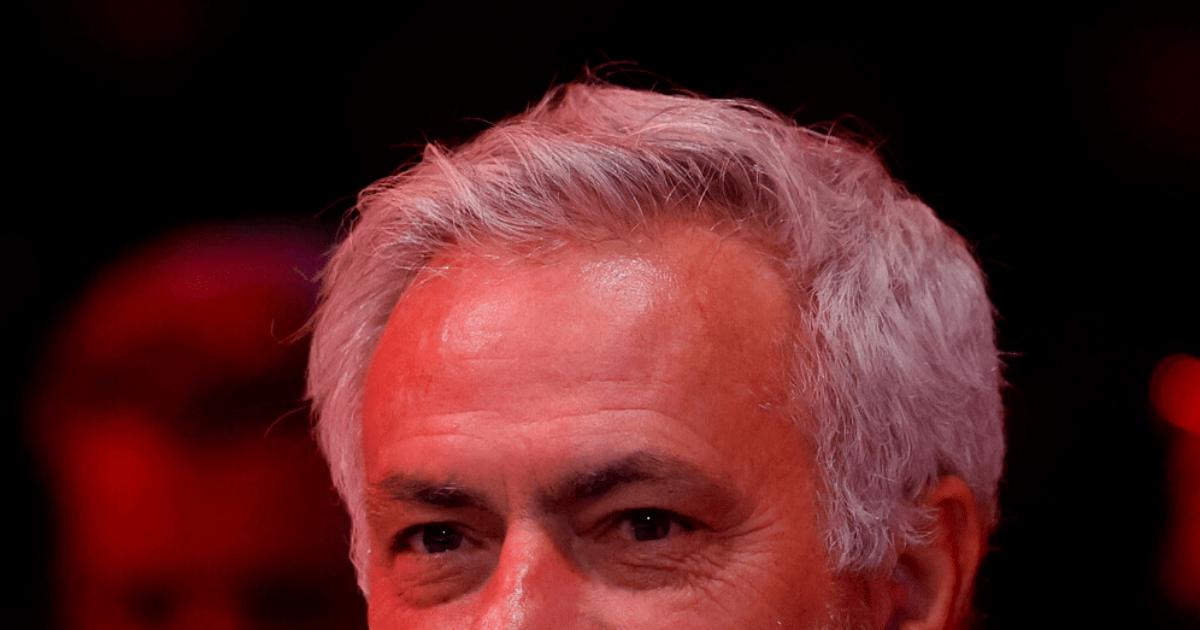Star-Studded Ringside
Former Chelsea and Manchester United manager, Jose Mourinho, made a grand entrance at the Anthony Joshua vs. Francis Ngannou fight in Riyadh, flashing his personalized phone case as he took a front row seat.
Despite being currently unemployed after his dismissal from Roma, Mourinho seemed to be enjoying the action-packed event, capturing moments from the ringside.
Celebrity Encounters
Mourinho wasn't the only football legend in attendance, as Brazilian Ronaldo and Cristiano Ronaldo were also spotted at the Kingdom Arena, with the latter having watched Ngannou's previous fight against Tyson Fury.
Joshua vs. Ngannou
As Ngannou weighed in at 19st 6lb compared to Joshua's 18 stone, the stage was set for an intense showdown between the two heavyweight fighters.

Ngannou, expressing his determination, stated, "I’m going out there to prove you can be an underdog and take it," while Joshua confidently proclaimed, "I'll deliver. I'm the postman."
Frequently Asked Questions
How important are physical conditioning and training for professional boxers?
Physical fitness is essential for professional boxing. Sport requires high levels strength, speed endurance and agility. Professional boxers should follow a tailored fitness plan that includes aerobic and aerobic workouts, strength and endurance training, and flexible exercises. Without superior physical conditioning, a boxer’s ability to train effectively and perform in the ring is significantly compromised.
What should you look for when choosing a boxing trainer?
If you are looking for a boxing trainer or coach, look for someone with experience, who has a proven track record of success, has a similar coaching style and a thorough understanding of both the technical and strategic elements of the sport. A good trainer will also emphasize safety, conditioning, and personal growth. A coach that motivates and communicates well is important in order to achieve your full potential.
Anyone can learn how to box professionally.
Not everyone can compete at the professional level. Professional boxing demands a unique combination of talent as well as physical abilities, mental strength and dedication. Boxers who are interested in the sport must be prepared to accept the inherent dangers. A thorough screening by a boxing trainer can determine whether someone has the potential to pursue a career in professional boxing.
What are the risks associated with professional boxing?
As with any contact sport there are inherent risks in professional boxing. These include acute injuries such as cuts, bruises, broken bones, and head trauma, as well as potential chronic conditions from repeated impacts, such as concussion syndromes or neurological disorders. While proper training, safety equipment and compliance with boxing regulations can reduce the risks, they will never be eliminated. To box professionally, you must accept these risks and be able to recognize them.
How important are mental toughness and professional boxing in the world of sport?
Mental toughness is as vital as physical conditioning in professional boxing. Resilience, focus, pressure-handling ability, and psychological fortitude are all required in the sport. Mental preparation includes visualization, stress management, and developing a mindset that is ready to face the challenges in the ring. Without mental toughness, a boxer may struggle to perform optimally under the intense conditions of professional competition.
How do boxers maintain weight and their weight class?
Boxers manage their weight by adhering to strict diets and precise training regimens. Nutritionists will help develop a weight loss plan for boxers that is based on their goals and doesn’t compromise nutrition or training energy. It is important to maintain a regular exercise routine and check your weight regularly, especially as you approach a fight. Weight management involves a strategic approach that, if not performed correctly, can result in health problems and/or poor performance.
What are some of the most important components in a boxer’s training regime?
A boxer’s regular training routine usually consists of multiple key components. These include technical skills development, tactics drills, strength-and-conditioning, sparring, as well as mental preparation. Tactical drills allow for the development of fight strategies while focusing on technique. Training exercises increase athleticism and sparring gives you a practical fighting experience. Mental training builds confidence, focus and resilience.
Statistics
- As per recent surveys, only about 17% of professional boxers reach a title shot opportunity in their careers.
- Less than 10% of professional boxers are undefeated throughout their career, highlighting the sport’s competitive nature.
- Research shows that a boxer’s reaction time is typically under 0.25 seconds, honed through repetitive drills and sparring.
- Approximately 80% of professional boxers start their career in the amateur ranks before transitioning to the professional level.
- Statistical data indicates that there has been a 15% increase in the number of professional boxing gyms over the last decade.
- On average, a professional boxer spars between 100 to 200 rounds in preparation for a major fight.
- Reports suggest that successful professional boxers can earn upwards of 50 times more than the median purse for entry-level professionals per fight.
External Links
proboxing-fans.com
titleboxing.com
boxingforum24.com
boxingnewsonline.net
boxingscene.com
ringtv.com
usaboxing.org
How To
Learn how to improve your boxing footwork
Professional boxers must have a strong footwork to be successful. Start by improving your stability with balance exercises. You can use agility ladder drills to enhance your foot speed. Shadowboxing with a reflective surface can be a good way to improve your skills. Jump rope workouts will help build your endurance and rhythm. Regular sparring sessions can also help you gain practical experience on how to move effectively around the ring when under pressure.

